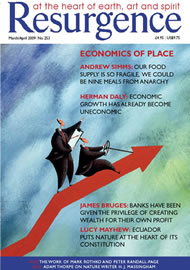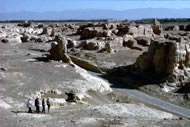EXCEPT FOR TOURIST officials and businessmen, people who are born and raised in the historic towns along the Silk Road do not know or care that they actually live on the Silk Road. As Colin Thubron remarks in his new travelogue, the term ‘Silk Road’ was coined only in the nineteenth century by the German geographer Friedrich von Richthofen for a network of ancient trade routes that started in the Chinese capital of Xian and ended in the Mediterranean coasts of Europe.
Shadow of the Silk Road comes from the pen of a renowned British travel writer and novelist who spent a year re-tracing the 7,000-mile Silk Road. Thubron skillfully blends ancient mythologies, geographies and histories with modern changes and challenges. This region of our planet is ancient that is bound in the history of Chinese, Iranian and Turkish peoples. This region is also a historical interface of Taoism, Buddhism, Zoroastrianism, Manichaeism, Christianity and Islam. And yet it is little known to the outside world even in the twenty-first century.
Thubron’s travelogue is divided into three parts: China spanning from Xian through the northern valleys of the Qilian Shan and Kulun Mountains to the town of Kashgar in northern Tibet; the Central Asian countries of Kyrgyzstan, Uzbekistan and Afghanistan; and Iran and Turkey to the west. Each of these regions has experienced a different development (or under-development) path in its recent history, and Thubron gives voice to his hosts and guides to narrate the stories of their lands and societies. These discussions and observations become more interesting as Thubron compares his recent journey with his previous visits to these countries.
As China has transformed its Communist path to a mixture of state capitalism and people’s commercial materialism in recent decades, the country’s industrial and economic developments have been rapid and remarkable, but so are China’s visible and hidden problems. Apart from the pollution of rivers and urban air, Thubron refers to the spiritual poverty (and thirst) of millions of Chinese youth who have been raised in a Maoist educational and social environment.
As Thubron visits historical towns and villages to the south of the Taklamakan Desert, we learn that Tibet is not the only ethnic and religious problem of present-day China. Thubron reports on how the Chinese government has suppressed the Turkish-speaking and Muslim Uighur people who want social, economic and religious freedoms in their vast homeland to the north of Tibet.
The Central Asian states, which gained independence after the collapse of the Soviet Union, have thousands of years of cultural history, but they are facing modern problems of their own. New dictatorial establishments, corruption, unemployment, lack of capital and management to create jobs, decline of agriculture, and inflating prices of urban life. People’s reaction to these new conditions are mixed: some express nostalgia for the former Soviet period when they were at least well fed, some have revived old religious superstitions, and the majority of people (like everywhere else) are simply trying to make ends meet.
Thubron’s travels through Iran reveal a complex society that has evolved after the 1970 revolution – politically theocratic, rough and rigid – but as Thubron moves behind the official norms, he meets people who are tolerant, hospitable, educated, proud and life-loving, whose culture has produced the likes of Omar Khayyam. Thurbon indeed visits the famed poets’ tomb in Nishabur and remembers lines from Edward Fitzgerald’s translation of the Rubaiyat.
The last stop in Shadow of the Silk Road is the Turkish port town of Antioch (Antakiya) where Thubron, walking along the brilliant turquoise shoreline of the Mediterranean, felt that “to west and east the sky was not the blue calm of my imagined homecoming, but a troubled cloudscape that swept the sea in moving gleams and shadows.” This notion, which comes at the conclusion of Thubron’s travellogue, is, no doubt, a reference to hard problems and challenges that both the Western and the Eastern realms of our world are currently facing. But cross-cultural understanding is a vital contribution toward solving these local and global problems, and in this regard, travel writers and books such as Shadow of the Silk Road play an important role. This is a fruitful product of Thubron’s arduous, and sometimes dangerous, journey. •








